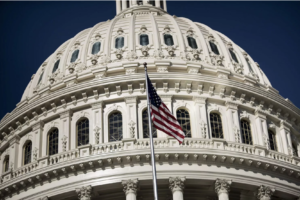A conversation with a congressman that actually made me hopeful

December 3 at 7:45 PM
Raja Krishnamoorthi was born in New Delhi 44 years ago and moved to the United States three months later. His family lived in public housing and needed food stamps to get by.
Today he is a freshman congressman from Illinois — and a conversation with him can leave you feeling hopeful, even at this often unhopeful time, about the future of our democracy.
Even if what Krishnamoorthi really wants to discuss, rather comprehensively, is his bipartisan bill on career and technical education.
Not that Krishnamoorthi, a Democrat, is complacent about our problems or tepid in opposing the administration. The tax bill being rammed through Congress is “redistribution, not reform,” he told a colleague and me during a visit to The Post last week.
He is amazed that the Republican majority would target higher education, and especially graduate students, “given all the talk about the need” for more scientists and engineers.
He’s dismayed by how the House operates. “There’s a lot of good, bipartisan legislation that passes in committee and then gets bottled up,” he said. “As a businessman, it surprised me. Why not start with the stuff we agree on, build up trust and make progress? It’s not happening, and that’s really sad to me.”
Krishnamoorthi studied mechanical engineering at Princeton University; became a lawyer at Harvard Law School; was introduced to politics in Barack Obama’s first, losing congressional campaign in 2000; took on a series of state government jobs, including helping to start an anti-corruption unit in the state attorney general’s office (“Business was very good”); and then went into the solar-energy business.
But much of his motivation goes back to his family’s early struggles in this country, which Krishnamoorthi’s father never let him and his brother forget.
“Every night at dinner, my father would say something about the greatness of the United States — and tell us to make sure the government is there for the next people who come along and need it,” he said.
Is that promise at risk? Krishnamoorthi said that President Trump has “connected with the angst” of people who feel left behind — “but he’s saying, the reason for your problem is that brown-skinned guy over there.”
“It’s the challenge for people in my party to address these people and appeal to their better angels and say, ‘Here’s how we can get to a better place.’ ”
Which brings him back to, yes, career and technical education, known (of course) as CTE. Working with a Republican congressman from Pennsylvania, Glenn “GT” Thompson, Krishnamoorthi managed to win unanimous approval in the House for an authorization bill on the subject, now awaiting Senate action. It would spend only a little more than $1 billon per year, but the congressmen say that would spur a lot more private investment.
Given that some two-thirds of Americans don’t have four-year college degrees, Krishnamoorthi said this kind of training is essential, and his constituents understand that well. “It’s giving them hope that their children can do as well or better than they do,” he said.
As he talked about working with a Republican on the seemingly prosaic task of reauthorizing CTE, I thought back to a compelling lecture I had just heard from Brookings Institution scholar William A. Galston on “the populist challenge to liberal democracy.” Galston talked about the need to “forget about economic aggregates and focus on inclusive growth” and to make democratic institutions work because “gridlock frustrates ordinary citizens.”
Krishnamoorthi told us he worries that Trump has “unleashed xenophobia and fear of the foreigner and fear of the other,” and not only among Republicans. He said that one of his primary opponents last year circulated materials showing the twin towers exploding next to Krishnamoorthi’s picture with an airplane flying overhead, implying he was a terrorist.
But he also was amazed, when he went to O’Hare International Airport to help people caught up in Trump’s travel ban in January, to find thousands already there, he said. In his district, there are Muslims, Hindus (like Krishnamoorthi), Jews, Sikhs and other groups who have been at odds with each other pretty much forever. “But I say, you have to set that aside, because this is an existential threat,” he said. “And they’re doing it. So that’s positive.”
In the House, he has been struck by how many new members, of both parties, like him want to get beyond paralysis and partisanship.
“I think with the right leadership on both sides and the right president, we can get a lot done,” he said.
Yes, those preconditions may seem impossibly distant right now. But circle back to one more piece of Galston’s wisdom.
“Liberal democracy is fragile, constantly threatened, always in need of repair,” he said, delivering the 14th annual Seymour Martin Lipset Lecture on Democracy in the World at the Canadian Embassy. “But liberal democracy is also strong, because, to a greater extent than any other political form, it harbors the power of self-correction.”
Author: Fred Hiatt
Original Article
